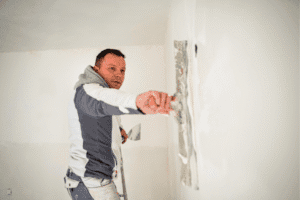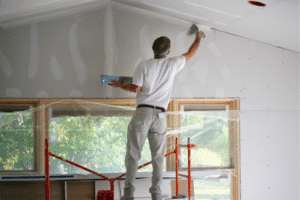Are you dealing with unsightly holes, cracks, or water damage in your drywall? Don’t let these issues linger and lower the value of your home. Whether you’re facing minor dents or major structural damage, drywall repair is essential to restoring the look and safety of your walls. In this manual, we’ll cover the whole lot, from common causes of drywall harm to expert repair guidelines. Continue analyzing to find out how professional drywall restoration can restore your walls to their former glory!

Drywall is a versatile material used to create smooth, sturdy walls and ceilings in homes and businesses. Made of gypsum sandwiched between two layers of paper, it offers a quick and cost-effective solution for interior construction.
Over time, drywall can sustain damage from everyday wear, moisture, or accidents, making drywall repair essential for maintaining the appearance and integrity of your space. Whether you’re remodeling or simply fixing minor damage, understanding drywall is the first step in a successful repair.
Drywall damage can occur for several reasons, ranging from everyday wear and tear to more significant issues like water damage. Understanding the commonplace reasons permits you to deal with issues early on, preventing expensive maintenance later. Let’s explore the most common reasons why drywall gets damaged and needs solving. Some of the most common reasons consist of:
Drywall can sustain various types of damage due to factors like accidental impacts, moisture, and structural issues. It’s important to understand the various types of drywall damage in order to choose the best repair method. This knowledge helps homeowners address minor issues quickly or seek professional help for more serious problems.
Caused by impacts from furniture, doors, or accidental knocks. These are often simple to repair with patching material.
These issues often arise from factors like building settling, shifts in temperature, or general movement. Cracks may require patching and refinishing.
Leaks from plumbing or roofing can cause drywall to soften, warp, or stain. Water damage often needs special attention to prevent mold.
When nails or screws used to secure drywall pop out, they cause bumps on the surface. This can be fixed by reattaching the nails and applying compound.
Not all drywall damage is the same. Some issues, like small holes or hairline cracks, can be easily fixed with a quick drywall repair. However, more significant issues, such as water damage, large cracks, or structural problems, require a more thorough approach.
It’s important to evaluate the damage carefully to decide whether a DIY repair is sufficient or if you should seek professional help. Addressing the problem early can save you time and money in the long run!

Repairing drywall is a manageable task for homeowners who are willing to invest a bit of time and effort. Whether it’s a small hole, crack, or dent, DIY drywall repair can help restore the beauty and function of your walls. Below are some essential tips to ensure successful drywall repairs.
When it comes to fixing drywall, trust the professionals to get the job done right. Our expert drywall repair services ensure that your walls are restored to perfection, whether it’s a small crack or major damage.
We take pride in delivering high-quality repairs that not only fix the issue but also prevent future problems. With attention to detail and a commitment to customer satisfaction, we’re here to help you maintain a beautiful and safe home.
Choosing the right drywall repair service is crucial to ensure your repairs are done correctly and efficiently. Whether dealing with small dents or extensive damage, a professional service can restore your walls to their original condition. Here’s how to make sure you select the best option for your needs. Keep the following factors in mind:
The cost of drywall repair depends on the extent of the damage and how severe the issue is. Small holes or cracks may only cost a few hundred dollars to repair, while larger issues like water damage or structural problems can be more expensive.
It’s essential to get a professional assessment to understand what needs to be fixed. Investing in drywall repair early can save you from higher costs down the road and keep your walls in top shape.

The cost of drywall repair can vary depending on the size and severity of the damage. Delaying repairs can lead to more extensive damage, higher costs, and the potential for health risks, especially with issues like mold. Let’s explore the key benefits of addressing drywall damage quickly. Addressing drywall damage early can prevent further complications, such as:
At JLM Handyman Services, we specialize in providing expert drywall repair to restore your walls and ceilings to their original condition. If you need a quick and reliable solution, don’t hesitate to contact us for a consultation.
Call us at 443-362-1179 or book an appointment online to get started with your drywall repair project today!
✅ Drywall damage can result from impacts, water leaks, structural settling, or improper installation.
✅ Clean the area, apply patching compound, smooth it, and then paint to match the wall.
✅ Hire a professional for large holes, water damage, or structural issues to ensure proper repair.
✅ Look for soft, discolored, or swollen spots and mold growth, which indicate water damage.
✅ Drywall repair typically costs between $200 to $600, depending on the damage size and complexity.